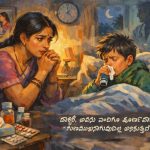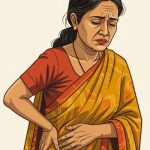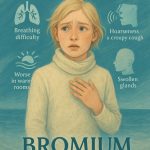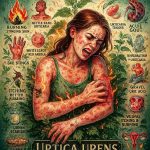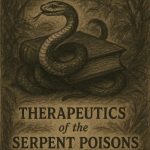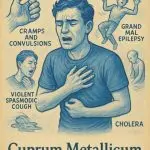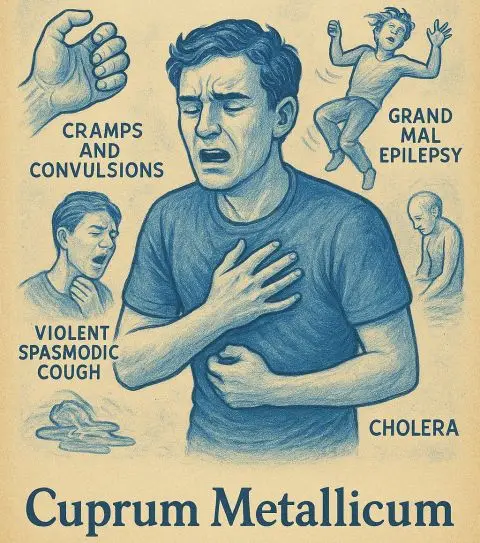
Cuprum metallicum, or copper, is a prominent remedy in homeopathy, primarily characterized by spasmodic affections, cramps, and convulsions.
Its indications often involve violence in symptoms and a tendency for symptoms to appear periodically and in groups.
Here are the bedside indications for Cuprum metallicum:
1. General Appearance and Physical State:
- Icy coldness of the whole body, or intense coldness of the surface, especially hands, feet, and extremities.
- Blueness or bluish-red discoloration of the skin, face, lips, and nails (cyanosis). The skin may also be described as bluish, marbled, or bloated.
- Cold, clammy, viscid sweat, especially on the forehead, during collapse.
- A dull, coppery, pale, sallow, earthy, or brownish complexion.
- Great prostration and lassitude, often described as a “deathly feeling”.
- Emaciation.
- A tense, cramped attitude and body posture.
- Weakness of muscles and relaxation of the body when convulsions are not present.
2. Muscular and Nervous System (Keynote Symptoms):
- Violent cramps, convulsions, and spasms affecting almost any part of the body, from simple twitching to general contortions.
- Spasms often begin in the fingers and toes and spread towards the center of the body.
- Clenching of the thumbs across the palms of the hands is a very characteristic sign, often indicating an impending epileptic fit or general tension.
- Muscles, particularly of calves and thighs, drawn up into visible knots.
- Violent jerking, twitching, quivering, and trembling of muscles.
- Epileptic fits with a shriek or cry preceding the attack, frothing at the mouth, rolling eyeballs, and often involuntary passage of urine and feces. Aura may begin in the knees and ascend.
- Chorea with involuntary movements, sometimes brought on by fright, developing into general chorea, with silly behavior or violent hysterical symptoms.
- Opisthotonos (arching of the trunk upwards).
- Stiffness of limbs and body, jaws clenched.
- Difficulty in stopping muscular responses, leading to exhaustion.
3. Head and Face:
- Delirium of a violent character, often with incoherent talking, attempts to bite bystanders or objects, shrieking, or bellowing like a calf. Patient may appear frightened or malicious.
- Grinding of teeth.
- Spasmodic distortion of the face, contracted features, blue lips. Risus sardonicus.
- Eyes fixed, staring, sunken, glistening, turned upward, or rapidly rolling. Twitching of eyelids or blepharospasm.
- Vertigo with tendency to fall forward, or giddiness accompanying many ailments.
- Sensation as if cold water were poured over the head.
- Head drawn backward.
- Headache, especially over left eye, or a pressive headache ascending from nape to forehead. Violent, continuous headaches, aggravated by slightest pressure.
- Crawling sensation in the vertex or top of the head.
4. Oral Cavity and Throat:
- Strong, metallic, slimy, or coppery taste in the mouth, with an increased flow of saliva. Taste may be bitter or sweet.
- Constant protrusion and retraction of the tongue, like a snake.
- Audible gurgling noise when drinking fluids down the oesophagus or throat, as if water were poured from a bottle.
- Stammering or imperfect speech, hoarseness, or inability to speak due to spasms in throat muscles.
- Contraction of jaws, with foam at mouth.
- Ulceration and swelling of gums, sometimes with a greenish or purple seam.
- Voice changes, sounds like “bellowing of a calf” or “croaking of frogs” or a “pressed sound like a baby”.
5. Gastrointestinal System:
- Extreme nausea, described as “greater than any other remedy”.
- Violent, spasmodic vomiting, often described as “terrific”.
- Vomiting is relieved by drinking cold water.
- Vomited matters are usually bluish, greenish, or flaky, sometimes bloody or frothy.
- Violent colic and abdominal spasms, often drawing the abdomen in, feeling like knife-thrusts or as if intestines were drawn into knots.
- Abdomen may be tense, hot, tender to touch, hard as a stone or board, or contracted.
- Diarrhea: watery, greenish, bloody, slimy, or flocculent/whey-like; often involuntary and profuse, with tenesmus and prostration. May alternate with constipation.
- Hiccough, often preceding spasms or vomiting.
- Craves cool drinks. Aversion to milk.
6. Respiratory System:
- Intense dyspnoea, often suffocative attacks, cannot bear anything near the mouth or face.
- Spasmodic coughs, especially whooping cough, which are long-lasting, suffocating, and cause the face to turn blue/purple, often with vomiting of mucus or food.
- Cough is ameliorated by drinking cold water.
- Rattling in the chest with cough, or when awake.
- Asthmatic attacks, often spasmodic and occurring around 3 a.m.. These often appear to originate from nervous spasm rather than inflammation.
- Spasmodic constriction of the chest, sometimes feeling like a knife transfixing to the back, which can take away the breath and voice.
7. Genitourinary System:
- Scantiness or complete suppression of urine, sometimes leading to uraemic convulsions.
- Menses may be too early, too profuse (dark, clotted, stringy blood), or scanty/irregular/painful.
- Violent cramps during painful menstruation, extending into the chest, before, during, or after suppression of menses.
- Puerperal convulsions or after-pains, especially with cramps in calves and soles.
- Cramps may prevent coition in men who are prematurely old or have been abstinent, forcing them to moan.
8. Mental and Emotional State:
- Maliciousness, desire to injure, rage, or furor; may bite and strike others, or make fun of them.
- Fear, especially of being approached by others, of strangers, or of imaginary persecutors.
- Great sense of guilt, often without a clear reason, or stemming from past thoughts/fantasies.
- Restlessness and tossing about, often with great anxiety.
- “Cramped intellect”: slow in grasping and comprehending, repeatedly asking for clarification (“What did you say?”).
- Intense emotions followed by intense suppression, leading to violent cramps or outbursts.
- A “serious” disposition, arising from an inability to let go.
- Alternation of gaiety and depression.
- Bodily and mental exhaustion from over-exertion of mind or loss of sleep.
- A “short circuit” spasm can occur when a self-critical or disagreeable idea (which the intellect cannot process) immediately manifests as a physical jerk, grimace, or convulsion.
- The look on the face can be a mixture of seriousness and anger, or even frightening.
9. Modalities:
- Aggravation: Contact, vomiting, at night, before menstruation, 3 a.m. (cough/asthma), cold air/wind, hot weather, new moon, movement, touch, from repercussed eruptions, during pregnancy, loss of sleep, suppressed foot-sweat.
- Amelioration: Drinking cold water (vomiting, cough, spasms, colic), perspiration, mesmerism, pressure (for abdominal pains), lying down (for some spasmodic symptoms).
10. Causation:
- Suppressed eruptions (measles, scarlet fever, erysipelas, skin conditions).
- Suppressed discharges (menses, leucorrhoea, diarrhoea, foot-sweat).
- Fright or vexation.
- Overtaxing of both body and mind, or loss of sleep.
- Abuse of iron (leading to chlorosis).
- Much indulgence in alcohol and sex, leading to premature aging and exhaustion.
- Metastasis to the brain from other organs.

